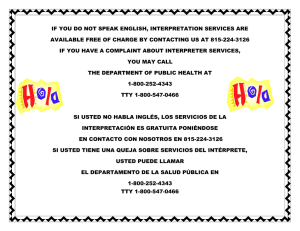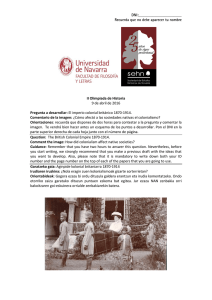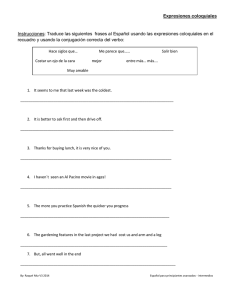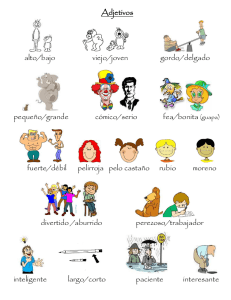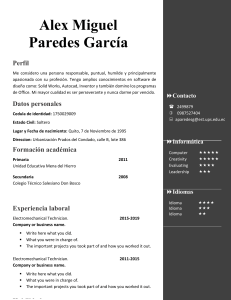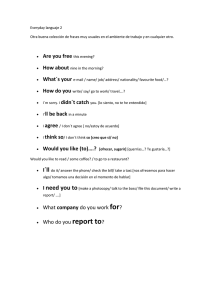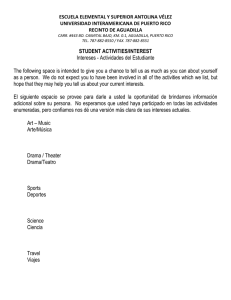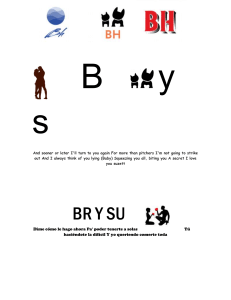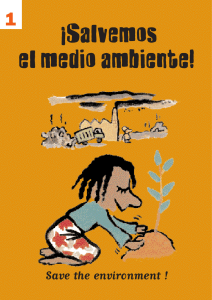frases cotidianas ingles principiantes-everyday conversations english dialogos ingles principiantes dialogs english beginners
Anuncio
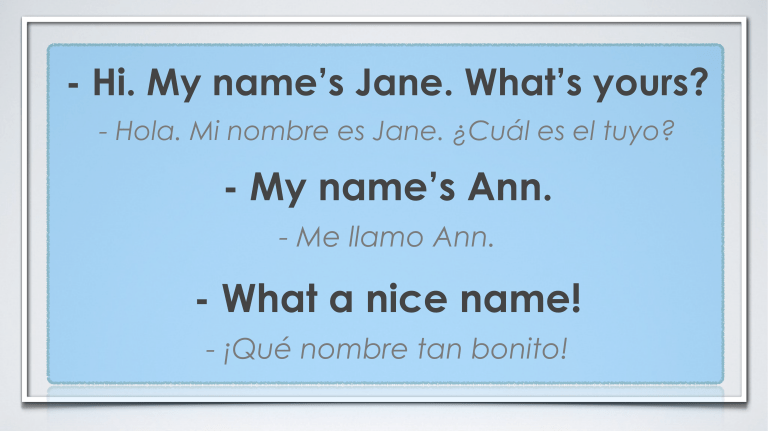
- Hi. My name’s Jane. What’s yours? - Hola. Mi nombre es Jane. ¿Cuál es el tuyo? - My name’s Ann. - Me llamo Ann. - What a nice name! - ¡Qué nombre tan bonito! - Thank you. - Gracias. - It was nice meeting you. - Fue un placer conocerte. - Same here! - Igualmente! - Can you tell me what’s the date today? - ¿Puedes decirme qué día es hoy? - It’s Sunday, the 8th of March. - Es domingo, 8 de marzo. - I don’t think English is easy. - No creo que el inglés sea fácil. - Why do you think so? - ¿Por qué piensas eso? - Because I have to work hard. - Porque tengo que trabajar duro. - I think you should watch some English movies. It’s fun! - Creo que deberías ver algunas películas en inglés. ¡Es divertido! - I guess you’re right! Let’s watch a movie right now! - Supongo que tienes razón! Vamos a ver una película ahora mismo! - Hi! Where’re you going? - ¡Hola! ¿Dónde vas? - I’m going to work. - Me voy a trabajar. - Why so early? It’s only 6am. - ¿Por qué tan pronto? Son sólo las 6 de la mañana. - That’s right, but today I start at 7am. - Así es, pero hoy empiezo a las 7 de la mañana. - Ann, can you please give me that book? - Ana, ¿podrías darme ese libro? - Here you are. - Aquí tienes. - Thank you. - Gracias. - You’re welcome! - No hay de qué! - My bag, please. - Mi bolso por favor. - Which one is it? Cuál es? - It’s one of those, there. - Es uno de esos, allí. - This one? - ¿Este? - No, not that one. - No, ese no. - What colour? - ¿Que color? - It’s red… Yes. That’s it. Thank you. - Es de color rojo … Si. Es ese. Gracias. - You’re welcome! - No hay de qué! - Hi, glad to see you! - Hola, me alegro de verte! - Hi, so am I. - Yo también. Today’s your birthday, isn’t it? - Hoy es tu cumpleaños, ¿no es así? - That’s right. It’s kind of you to remember. - Así es. Que amable por tu parte recordarlo. - Well, many happy returns of the day. Here’s a present for you. - Bueno, ¡ muchas felicidades ! Aquí tienes un regalo. - Oh, thank you. What beautiful flowers! ¡ Oh, gracias ! ¡ Que flores tan bonitas ! - What shall we have for breakfast? - ¿Qué desayunamos ? - How about some bread and butter, two eggs and a cup of tea? - ¿Qué te parece un poco de pan y mantequilla, dos huevos y una taza de té? - Well, that’s fine with me, but I'd like to add some biscuits too. - Bueno, me parece bien, pero me gustaría añadir algunas galletas también. - Would you like some chocolate biscuits? - ¿Te gustarían unas galletas de chocolate? - Of course! They’re my favorite! - ¡Por supuesto! Son mis favoritas! - What are you looking at? - ¿Qué estás mirando? - I am looking at that book. - Estoy mirando ese libro. - Which one? Point to it. - ¿Cuál? Señalalo. - That one, there. - Aquel de allí. - Oh, yes. Beautiful one, isn't it? - Oh, sí. Es hermoso, ¿no es así? - Yes, it is. I wish I had it. - Sí, lo es. Ojalá lo tuviera. - So do I. - Yo también. - How about closing the window? - ¿Qué te parece cerrar la ventana? - No, I don’t want to. - No, no quiero. - Aren’t you cold? - Es que no tienes frío? - Not really. - No realmente. - Well, I am. - Pues yo si. - In that case you should close it yourself. - En ese caso, deberías cerrarla tu misma. - Excuse me. Could you help me, please? -Disculpe, puede ayudarme, por favor? - I'll try. How can I help you? - Lo intentaré. ¿Cómo puedo ayudarle? - Something's wrong with my alarm-clock. - Algo le pasa a mi despertador. - Let me see ... Sorry, but I can't help. - Déjeme ver ... Lo siento, pero no puedo ayudar. You'd better get it repaired. Será mejor que lo lleve para que lo reparen.. - This is my new dress. What do you think of it? - Este es mi nuevo vestido. ¿Qué te parece? - It's absolutely gorgeous. - Es absolutamente precioso. - Where did you get it? - ¿Dónde lo has comprado? - I’ve bought it in London. - Lo compré en Londres. - Wow, you are so lucky! - Vaya, que afortunada eres! - What's the matter with you? - ¿Qué es lo que te pasa? - I'm not feeling very well today. - No me encuentro muy bien hoy. - Do you have a headache? - ¿Te duele la cabeza? - Yes, and a sore throat, too. - Sí, y también tengo un dolor de garganta. - Well, in that case, you'd better stay at home. - Bueno, en ese caso, es mejor que te quedes en casa. - I guess I'll have to. - Supongo que tendré que hacerlo. - What’s the matter with you? - ¿Qué es lo que le pasa? - I'm not feeling very well, doctor. - No me encuentro muy bien, doctor. - What exactly is the trouble? - ¿Cuál es exactamente el problema? - I've got an awful headache. - Tengo un terrible dolor de cabeza. - Are you working hard and getting too little rest? - ¿Está trabajando duro y está descansando muy poco? - Yes, I´m afraid so. - Si, me temo que si. - Now, you stay in bed until you're well. - Ahora, será mejor que descanse hasta que se mejore. -Do you have any plans for next weekend? ¿Tienes algún plan para el próximo fin de semana? - Not really. -No realmente. - How would you like to go on a trip? - ¿Te gustaría ir de viaje? - Where to? - ¿A dónde? - To London. - A Londres. - Oh, yes, I'd be glad to! - Oh, sí, me encantaría! - I need to go to the Railway station. - Tengo que ir a la estación de tren. - What for? ¿ Para qué ? - To meet a friend of mine. How do I get there? - He quedado con un amigo. ¿ Cómo llego allí ? - Catch a bus. It's the quickest way, I think. - Coge un autobús. Es lo más rápido, creo. May I help you? - ¿Puedo ayudarle? - Oh, yes, please. I want some shoes. - Oh, sí, por favor. Quiero comprar unos zapatos. - What size, colour? - ¿De qué tamaño, color? - 40, black, please. - 40, negro, por favor. - Here you are. - Aquí tiene. - Thanks. May I try them on? - Gracias. ¿Puedo probármelos? - Do, please. - Si por supuesto. - They're all right. How much are they? - Están bien. ¿Cuánto cuestan? - 50 dollars please. - 50 dólares, por favor. - Can I help you? - ¿Puedo ayudarte? - Yes, I want a large box of chocolates for a present, please. - Sí, quiero una gran caja de bombones para un regalo, por favor. - How about this one? - ¿Qué tal esta? - Oh, yes. It'll do. How much is it? - Ah, sí. Esta vale. ¿Cuánto cuesta? - 7 pounds, please. Anything else? - 7 libras, por favor. ¿Algo más? - Nothing else. Thank you. - Nada más. Gracias. - Will you be going shopping today? - ¿Vas a ir de compras hoy? - Why do you ask? - ¿Por qué lo preguntas? - I'd like to ask you a favour. - Me gustaría pedirte un favor. - What can I do for you? - ¿En que puedo ayudarte? - Would you get me some oranges? - ¿Me comprarías unas naranjas? - Sure, if you give me some money. I'm very short. - Claro, si me das algo de dinero. Estoy pasando por algunos apuros. - What's her telephone number? - ¿Cuál es su número de teléfono? - It slipped my memory. I know it, but I can't think of it. - Se me fue de la cabeza. - Me lo sé, pero no me viene ahora mismo a la cabeza. - Neither can I. - Ni a mi tampoco. - Well, it'll come back to me in a minute. - Bueno, lo recordaré dentro de un minuto. - What’s that girl’s name? - ¿Cómo se llama esa chica? - Do you mean the one in the red coat? - ¿Te refieres a la del abrigo de color rojo? - Oh, yes, that’s the one. - Oh, sí, esa. - It’s just slipped my mind. - Se me olvidó. - Think hard, will you? - Piénsalo bien, ¿quieres? - It’s just on the tip of my tongue. Lo tengo en la punta de la lengua. - You must remember. - Debes recordarlo. - I’ve got it at last! Caroline! - ¡Ya lo tengo por fin! Caroline! - What luck running into you! How are you getting on? - ¡Qué suerte toparme contigo! ¿Cómo te va? - Thanks. Everything’s all right. I’m quite well. - Gracias. Todo va bien. Estoy bastante bien. - You see, I was ill last week. - Verás, yo estaba enfermo la semana pasada. - What was the matter with you? - ¿Qué te pasó? - I had a cold, high temperature and a headache. - Tuve un resfriado, fiebre alta y dolor de cabeza. - Poor you! You had an awful time I should think. - Pobre! Seguramente tienes que haberlo pasado muy mal. - You’re right. - Tienes razón. - The weather’s fine today, isn’t it? - Hoy hace buen tiempo ¿verdad? - Yes it is. The sun’s shining brightly in the blue sky. - Sí, es cierto. El sol brilla en el cielo azul. - Is it warm in the street, I wonder? - ¿Hace calor en la calle, me pregunto? - I don’t think so. We’re in November now. - No lo creo. Estamos en noviembre. - Should I put a coat on? - ¿Debería ponerme un abrigo? - I think it might be a good idea. Creo que podría ser una buena idea. - How long shall we have to wait for her? - ¿Cuánto tiempo tendremos que esperar por ella? - I am afraid I’ve no idea. - Me temo que no tengo ni idea. - Well, I hope she won't be too long. - Bueno, espero que no tarde demasiado. I hope so too. - Yo también. - How about ringing her up? - ¿Qué tal si la llamas? - That's a good idea! - Que buena idea! - I’m going to have a party on Saturday. Can you come? - Voy a hacer una fiesta el sábado. ¿Puedes venir? - Yes, thank you for the invitation. What time shall I come? - Sí, gracias por la invitación. ¿A qué hora tengo que ir? - At 9 pm, please. - A las 9 de la tarde, por favor. - Ok. That suits me. - Ok me viene bien. If you want to download this lesson’s PDF and MP3 Please visit www.profesoraingles.com
